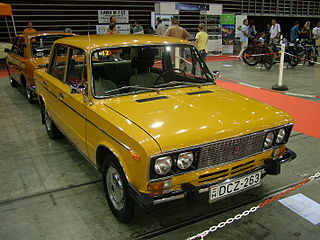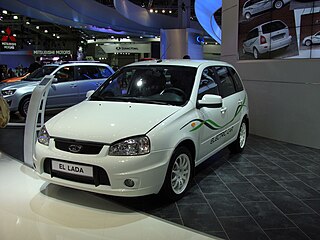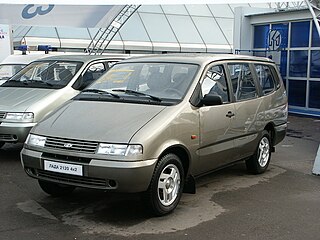 W
WThe Lada 110 or VAZ-2110 is a compact car built by the Russian automaker AvtoVAZ from 1995 to 2009. It spawned two close derivatives: the Lada 111 estate and the Lada 112 hatchback.
 W
WThe VAZ-2101 "Zhiguli", commonly nicknamed "Kopeyka", is a compact sedan car produced by the Soviet manufacturer AvtoVAZ and introduced in 1970, the company's first product.
 W
WThe VAZ-2101 "Zhiguli", commonly nicknamed "Kopeyka", is a compact sedan car produced by the Soviet manufacturer AvtoVAZ and introduced in 1970, the company's first product.
 W
WThe VAZ-2103 Zhiguli is a deluxe compact sedan car, produced by VAZ, introduced in 1972 and produced until 1984. Better known by its export name Lada 1500 outside of its native Soviet Union and popularly nicknamed Тройка in its domestic market. The car was developed jointly by VAZ and FIAT at the same time as Fiat 124 Special, and the two models had the same basis and influenced each other. 2103 was built under license and tailored for the Soviet and Eastern European market. The 2103 externally differs from its predecessor, the VAZ-2101 firstly by its four, that is, double sets of headlights, different grille and direction pointers, moldings on the sides of the body and larger taillights. Its main difference - the more powerful 75 hp 1,452 cc (88.6 cu in) straight four petrol engine. In addition, this model is distinguished by the presence of vacuum brake booster as well as self-adjusting rear brakes and internally on new, Fiat 125 based, front panel along with its steering wheel and improved dashboard featuring wood imitation, tachometer, oil pressure gauge and front panel clock.
 W
WThe VAZ-2106 Zhiguli is a sedan produced by the Soviet automaker VAZ, and later, after the breakup of the Soviet Union, also by Russian Izhevsk Avto and Ukrainian Anto-Rus. In export markets, it was known simply as Lada 1600 or alternatively as Lada 2106. In the domestic market it was popularly nicknamed Шестёрка. A hugely popular car and one of most successful Lada models, it was in serial production for 30 years, although production in the VAZ plant ended after 25 years, in 2001, with manufacture continuing at Izhevsk for the final five years.
 W
WThe VAZ-2101 "Zhiguli", commonly nicknamed "Kopeyka", is a compact sedan car produced by the Soviet manufacturer AvtoVAZ and introduced in 1970, the company's first product.
 W
WThe Lada / VAZ-2105, 2104 and 2107, collectively marketed as Lada Riva for right-hand drive models, the Lada Nova in Germany, and by multiple other names and markets, are a series of compact sedans of the Zhiguli line-up, built by Russian car manufacturer AvtoVAZ. Introduced in 1979 in the Soviet Union, and progressively introduced to Western European and global markets from the early 1980s, under the Lada brand, they were sold as saloons, and station wagon (2104) versions.
 W
WThe Lada / VAZ-2105, 2104 and 2107, collectively marketed as Lada Riva for right-hand drive models, the Lada Nova in Germany, and by multiple other names and markets, are a series of compact sedans of the Zhiguli line-up, built by Russian car manufacturer AvtoVAZ. Introduced in 1979 in the Soviet Union, and progressively introduced to Western European and global markets from the early 1980s, under the Lada brand, they were sold as saloons, and station wagon (2104) versions.
 W
WThe Lada / VAZ-2105, 2104 and 2107, collectively marketed as Lada Riva for right-hand drive models, the Lada Nova in Germany, and by multiple other names and markets, are a series of compact sedans of the Zhiguli line-up, built by Russian car manufacturer AvtoVAZ. Introduced in 1979 in the Soviet Union, and progressively introduced to Western European and global markets from the early 1980s, under the Lada brand, they were sold as saloons, and station wagon (2104) versions.
 W
WThe Lada Niva Legend, formerly called the Lada Niva, VAZ-2121, and Lada 4×4, is a series of exclusively 4WD, small (hatchback) and compact off-road cars, designed and produced by the Russian manufacturer AvtoVAZ since 1977 – initially for the rural market, but later models also aimed at urban users. Sold as the marque name Lada in many markets, the 3-door, 4x4 hatchback is continuously built since 1977. From the 1990s, three- and five-door wagons on a 50 cm (20 in) longer wheelbase, and an extra long pick-up, were added to the range. Following the demise of the original Land Rover and its successor Land Rover Defender in 2016, the Niva is the longest-running off-road car still in production in its original form. By the end of 2020, an estimated 650,000 plus Lada Nivas were on the roads of Russia, the Commonwealth of Independent (post-Soviet) States, and other countries.
 W
WThe VAZ-2108, known as the Lada Samara in much of Western Europe, is a series of small family cars produced by Soviet/Russian vehicle manufacturer AvtoVAZ under the Lada brand between 1984 and 2013. The model name Samara originally was used only for exported models, in the Soviet Union the same model was called Sputnik until 1991, when the sedan version of the Samara entered in production, using the export name. It was the first front-wheel drive serial car built in the Soviet Union after the LuAZ-969V. The Samara had been modified and restyled during the years of production before it was finally discontinued in December 2013.
 W
WThe LADA Ellada is the first serial Russian electric car produced by AvtoVAZ. It is built on the LADA Kalina chassis. It was publicly launched in 2011.
 W
WThe Lada Granta is a subcompact car developed by Russian automaker AvtoVAZ in collaboration with Renault, based on the Lada Kalina platform. Mass sales started in Russia on 1 December 2011.
 W
WThe Lada Granta 1600T WTCC is a racing car built under Super 2000 specifications, which will be competing in the FIA World Touring Car Championship.
 W
WThe Lada Kalina is a supermini car produced by the Russian manufacturer Lada (AvtoVAZ) since 18 November 2004 to July 2018. The name Kalina comes from the Russian name for a type of viburnum. It is also marketed as the Lada 117/119 in Finland.
 W
WThe Lada Largus is a compact estate car built by the Russian manufacturer AvtoVAZ since 2012. It is essentially a rebadged version of the Renault-developed first generation Dacia Logan MCV and is produced as a joint project with Renault and Nissan.
 W
WThe Lada Nadezhda or VAZ-2120 "Nadezhda" is a seven-person four-wheel-drive minivan, produced by the Russian automaker AvtoVAZ in 1998-2006.
 W
WThe APAL-2154 Сталкер (Stalker) is a Russian light SUV, originally assembled using the parts and mechanicals of Zhiguli cars. It was developed in the city of Togliatti, Russia by APAL (Ru:АПАЛ), a Russian automotive industries plastic parts supplier, in 2003. It was designed by Alexander Lyinsky and Sergey Nekrasov.
 W
WThe Lada Niva Legend, formerly called the Lada Niva, VAZ-2121, and Lada 4×4, is a series of exclusively 4WD, small (hatchback) and compact off-road cars, designed and produced by the Russian manufacturer AvtoVAZ since 1977 – initially for the rural market, but later models also aimed at urban users. Sold as the marque name Lada in many markets, the 3-door, 4x4 hatchback is continuously built since 1977. From the 1990s, three- and five-door wagons on a 50 cm (20 in) longer wheelbase, and an extra long pick-up, were added to the range. Following the demise of the original Land Rover and its successor Land Rover Defender in 2016, the Niva is the longest-running off-road car still in production in its original form. By the end of 2020, an estimated 650,000 plus Lada Nivas were on the roads of Russia, the Commonwealth of Independent (post-Soviet) States, and other countries.
 W
WThe Lada Niva Travel is a compact crossover utility vehicle (CUV) produced since 1998 by the AvtoVAZ Group. Originally called the VAZ-2123, the SUV was marketed as the Chevrolet Niva from 2003 to 2020, when AvtoVAZ was in a joint venture with General Motors, called GM-AvtoVAZ.
 W
WThe Lada / VAZ-2105, 2104 and 2107, collectively marketed as Lada Riva for right-hand drive models, the Lada Nova in Germany, and by multiple other names and markets, are a series of compact sedans of the Zhiguli line-up, built by Russian car manufacturer AvtoVAZ. Introduced in 1979 in the Soviet Union, and progressively introduced to Western European and global markets from the early 1980s, under the Lada brand, they were sold as saloons, and station wagon (2104) versions.
 W
WIzh 2126, nicknamed "Oda", is a compact hatchback produced by the Soviet automotive maker IZh between 1990 and 2005.
 W
WThe Lada Оkа is a city car designed in the Soviet Union in the later part of the seventies by AvtoVAZ. It entered production in 1988 powered by a 644 cc (39.3 cu in) SOHC two-cylinder engine. While developed at AutoVAZ by a team led by Yuri Kuteev, no production models were built there. Instead, manufacturing was outsourced to SeAZ factory in Serpukhov and ZMA in Naberezhnye Chelny. Massive plans were in place for a new plant in Yelabuga, but these failed to materialize. The car was also produced in Azerbaijan by the Gyandzha Auto Plant. The name comes from the Oka River in Russia upon which Serpukhov is situated.
 W
WThe Lada Priora is a compact car produced by the Russian automaker AvtoVAZ since March 2007. It is largely a restyled and modernised Lada 110 and replaced it in 2009. By May 16, 2012, 590,000 Prioras had been produced. Starting model year 2016, the Priora is not available for export market and has been replaced by Lada Vesta.
 W
WThe Lada / VAZ-2105, 2104 and 2107, collectively marketed as Lada Riva for right-hand drive models, the Lada Nova in Germany, and by multiple other names and markets, are a series of compact sedans of the Zhiguli line-up, built by Russian car manufacturer AvtoVAZ. Introduced in 1979 in the Soviet Union, and progressively introduced to Western European and global markets from the early 1980s, under the Lada brand, they were sold as saloons, and station wagon (2104) versions.
 W
WThe VAZ-2108, known as the Lada Samara in much of Western Europe, is a series of small family cars produced by Soviet/Russian vehicle manufacturer AvtoVAZ under the Lada brand between 1984 and 2013. The model name Samara originally was used only for exported models, in the Soviet Union the same model was called Sputnik until 1991, when the sedan version of the Samara entered in production, using the export name. It was the first front-wheel drive serial car built in the Soviet Union after the LuAZ-969V. The Samara had been modified and restyled during the years of production before it was finally discontinued in December 2013.
 W
WThe VAZ-2108, known as the Lada Samara in much of Western Europe, is a series of small family cars produced by Soviet/Russian vehicle manufacturer AvtoVAZ under the Lada brand between 1984 and 2013. The model name Samara originally was used only for exported models, in the Soviet Union the same model was called Sputnik until 1991, when the sedan version of the Samara entered in production, using the export name. It was the first front-wheel drive serial car built in the Soviet Union after the LuAZ-969V. The Samara had been modified and restyled during the years of production before it was finally discontinued in December 2013.
 W
WThe Lada Оkа is a city car designed in the Soviet Union in the later part of the seventies by AvtoVAZ. It entered production in 1988 powered by a 644 cc (39.3 cu in) SOHC two-cylinder engine. While developed at AutoVAZ by a team led by Yuri Kuteev, no production models were built there. Instead, manufacturing was outsourced to SeAZ factory in Serpukhov and ZMA in Naberezhnye Chelny. Massive plans were in place for a new plant in Yelabuga, but these failed to materialize. The car was also produced in Azerbaijan by the Gyandzha Auto Plant. The name comes from the Oka River in Russia upon which Serpukhov is situated.
 W
WVAZ-1151 or Гном (Gnome) is a city car concept from the Russian car company AvtoVAZ from 1990. Head designer was Petr Prusov.
 W
WThe Lada Vesta is a compact car produced by the Russian car company AvtoVAZ since 2015. It was presented in August 2014 during the Moscow International Automobile Salon and went into mass production on 25 September 2015 in Izhevsk.
 W
WThe LADA VFTS is a rally car based on the Lada 2105. Lada is a trademark of the Russian manufacturer AvtoVAZ. VFTS stands for Vilniusskaja fabrika transportnych sredstv, Russian for "Vilnius factory of vehicles".
 W
WThe VAZ-2108, known as the Lada Samara in much of Western Europe, is a series of small family cars produced by Soviet/Russian vehicle manufacturer AvtoVAZ under the Lada brand between 1984 and 2013. The model name Samara originally was used only for exported models, in the Soviet Union the same model was called Sputnik until 1991, when the sedan version of the Samara entered in production, using the export name. It was the first front-wheel drive serial car built in the Soviet Union after the LuAZ-969V. The Samara had been modified and restyled during the years of production before it was finally discontinued in December 2013.